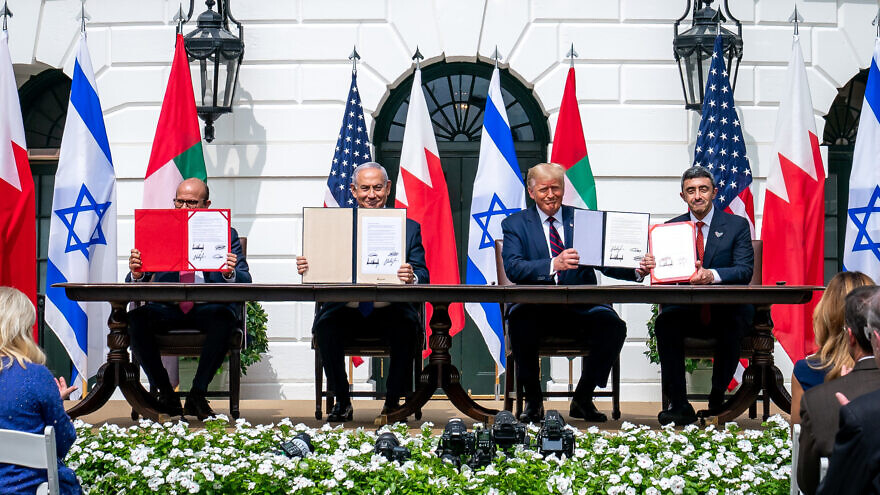The Jewish people gather for apples and honey every autumn to celebrate another year of an unconquered national soul. Despite millennia of exile from the Land of Israel and various waves of persecution in the Diaspora, the Jewish nation personifies unparalleled resilience. It has survived by upholding a strong identity with equally strong ethical foundations. The birth of the modern State of Israel, a nation that is 3,000 years old and 75 years young, endures as one of history’s most remarkable achievements.
Families in every corner of the world relish Rosh Hashanah by drawing upon timeless lessons connected to both our history and current affairs. One of latter is the momentous three-year anniversary of the Abraham Accords, a groundbreaking normalization agreement between Israel and the United Arab Emirates, Bahrain, Sudan and Morocco that continues to transform the Middle East and the world. Similar to Israel’s earlier agreements with Egypt and Jordan, the Accords have left an indelible mark in history by fostering Arab recognition and acceptance of Israel. However, what sets the Abraham Accords apart is its invitation to Jewish life.
In Judaism lie mystical revelations concerning the hidden order of the universe. The number three represents reconciliation and resolution, signifying the harmonization of opposing elements in a common goal and a higher purpose. Thus, the intersection of Rosh Hashanah and the three-year anniversary of the Abraham Accords epitomizes tikkun olam, the principle of repairing the world.
Gratitude is the luminous thread that connects the joyous Jewish New Year to acts of reflection, repair and renewal. Symbolizing the human life cycle, the round challah embodies a personal ritual of appreciation and rededication that makes the forthcoming year sweeter than the last and pushes the future generation a step ahead of the former. Other emblematic foods, such as the pomegranate with its 613 seeds, stand as a poignant reminder of this introspective occasion and a fresh commitment to the Torah’s 613 mitzvot.
Resounding blasts of the shofar beckon us on a profound journey of teshuvah. Traditionally associated with repentance, the Hebrew word teshuvah also means “answer” and “return,” emphasizing the interior nature of this process—akin to Socratic principles of relentless self-inquiry and self-awareness.
One of the 613 mitzvot is tzedakah, the obligation of financial generosity. During the high holiday season, Jews are instructed to give extra tzedakah, whether to charity, an organization, the needy on the street or a friend. The highest degree of tzedakah, however, is interpreted by Jewish philosopher Maimonides as a partnership with the recipient rather than financial aid—a learning opportunity promoting self-reliance and a path towards friendship.
Through the Abraham Accords, the U.S. facilitated a commercial collaboration that increasingly strengthens Israeli and Arab economies. Total trade between Israel and its regional partners reached nearly $3.5 billion in 2022, up from $1.1 billion in 2021. Diamond trade between the UAE and Israel reached $1.75 billion in 2022. Bahrain announced that it will invest in Israeli solar technology as part of its Vision 2030 initiative, which focuses on sustainable development and profitability. Most remarkably, Sudan, once home to the infamous 1967 Khartoum Resolution, in which the Arab states declared the “three no’s” against Israel, is now saying “yes” to trade with the Jewish state.
Tourism has been one of the most fruitful outcomes of this tzedakah-oriented mission. Once unimaginable, direct flights between the UAE and Tel Aviv have fostered unprecedented interpersonal relationships. Israeli and Arab dignitaries continue to meet, formulating geopolitical strategies and bridging cultural gaps.
The Hebrew word for love is ahavah, which is etymologically rooted in the Aramaic word “hav,” which means “give.” Thus, in the Jewish tradition, true love is characterized not by mere feeling but by practice. The newly developed relationship between Israel and the UAE is like a young couple starting to date, each enthusiastically sharing their souls. This blossoming relationship has produced synergetic economic, military, medical and educational efforts. The UAE recently integrated Holocaust education into its school system, while the Hebrew University of Jerusalem instituted new courses on the UAE’s geopolitics.
Relationships between Jews and Arabs are sparking a long-lost sense of commonality rooted in the ancient Judeo-Islamic tradition. Reflecting on how Jewish and Islamic teachings were adapted and appropriated and became mutually influential reinvigorates this revived renaissance that intertwines cuisine, language, music, history and faiths.
Despite its complicated past, the Middle East can lead with an empathetic heart characterized by an Abrahamic effect that transcends its current boundaries. Gleaning from the past, Rosh Hashanah inspires hope for the future. The boom of the shofar in the upcoming year can signal the long-awaited normalization between Saudi Arabia and Israel, setting the wheels of progress in motion again.


























